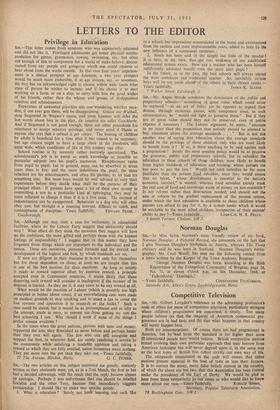LETTERS TO THE EDITOR
Privilege in Education
SIR;—This letter comes from someone who was expensively educated and did not like it. Privileged adolescents get better physical accom- modation for games, gymnastics, rowing, swimming, etc., but often not enough of this to compensate for a world of make-believe, discon- nected from any people and goings-on which one could. observe or hear about from the world outside. In that case four years' imprison- ment is a dismal prospect at age fourteen; a two year prospect would be much more endurable, if at age sixteen, say, or seventeen, the boy has an acknowledged right to choose within wide limits what class of person he wishes to imitate; and if his choice is to start working on a farm, or on a ship, to carry with him the good wishes of his friends, rather than the whines and groans of disappointed relatives and schoolmasters.
Experience of unwanted priorities sets one wondering whether para- dise, if one ever gets there, will be disappointing. Griisse mir Walhall, sang Siegmund in Wagner's opera, and most listeners will echo the last words about him in the play, du zeugtest em n edles Geschlecht. And if Siegmund is not good enough, there are other precedents for reluctance to accept selective privilege, and never mind if Dante or anyone else says that a refusal is per Wiese. The bossing of children by adults is beneficial for a time after it has ceased to be necessary: but age sixteen ought to have a large share of the freedoms, still quite wide, which conditions of life in this country can offer.
School routine is by necessity rather narrowly specialised. The schoolmaster's job is to pump as much knowledge as possible on particular subjects into his pupil's memories. Receptiveness varies from pupil to pupil; but in general, more can be absorbed in seven years than in five: and the more industrious the pupil, the more reluctant are his schoolmasters, and often his parents, to let him try something else. But most boys would be well advised to vary their experiences before they decide what shall be the purpose of their principal effort. If parents have .spent a lot of their own money in committing a son to a particular kind of upbringing, they may be more reluctant to change it than if it is a free issue. The menace of indoctrination can be exaggerated. Behaviour is a dog who will often obey you: but thought is a roaming tom-cat, difficult to catch, and contemptuous of discipline.—Yours faithfully, EDWARD PEASE. Guisborough.


































 Previous page
Previous page